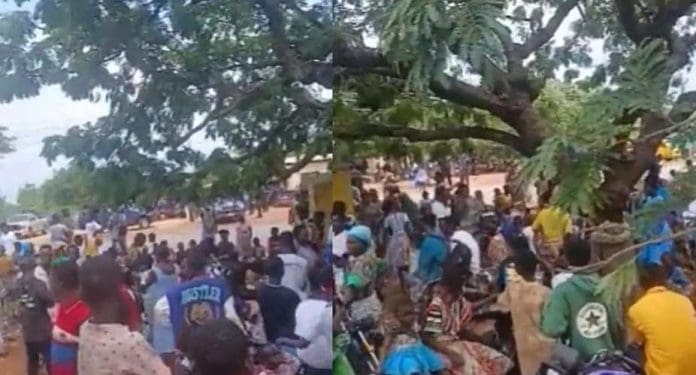United Nations Eminent Peace Ambassador Samuel Ben Owusu has joined urgent appeals for peace in Ghana’s escalating Gbiniyiri land conflict, warning that violence threatens the nation’s stability as the death toll rises to 31 and nearly 48,000 people remain displaced.
The diplomatic intervention comes as the violent dispute, triggered when a local chief sold land to a private developer without broader community consent, continues spreading across multiple communities in the Sawla-Tuna-Kalba District of northern Ghana’s Savannah Region.
Ambassador Owusu emphasized that dialogue, not weapons, offers the only path forward for communities torn apart by the conflict that began August 24, 2025. His appeal carries particular weight given Ghana’s reputation for peaceful conflict resolution across West Africa.
“We all know that we do not solve issues with cutlasses and guns,” the ambassador stated, addressing the warring factions directly. “We are one people and like siblings. Even if the land belongs to your brother, it still belongs to all of you.”
The peace envoy’s humanitarian focus resonated through his appeal to families caught in the violence, questioning the ultimate cost of continued fighting. His emotional plea highlighted how children become the ultimate victims when parents engage in deadly disputes over land rights.
The conflict has spread across approximately twelve communities since violence erupted over what military officials described as a dispute over land “no bigger than a room.” The seemingly minor disagreement has triggered devastating consequences that have shocked Ghana’s normally peaceful northern regions.
The destruction includes the burning of the Gbiniyiri Chief’s palace and hundreds of homes, forcing women and children to flee their communities as traditional authority structures collapse amid the violence.
Interior Minister Mubarak Mohammed Muntaka has responded by inaugurating a seven-member mediation committee with a one-month mandate to resolve the underlying land dispute. The government’s intervention reflects growing concern that the conflict could destabilize the broader region if left unchecked.
Ambassador Owusu’s appeal extends beyond the immediate crisis to address Ghana’s broader conflict prevention capabilities. He referenced violent incidents during Ghana’s 2024 elections as warning signs that the nation must take more seriously to prevent future escalations.
The peace advocate specifically called on President John Dramani Mahama to utilize intelligence resources more effectively to identify and manage potential conflicts before they spiral into deadly violence. His criticism suggests current early warning systems may be inadequate for Ghana’s evolving security challenges.
The Gbiniyiri conflict represents a critical test for Ghana’s conflict resolution mechanisms. The country has historically prided itself on peaceful dispute resolution, making the scale and intensity of this land conflict particularly alarming for regional stability.
The humanitarian crisis continues expanding as displaced residents seek shelter in neighboring communities, straining resources and potentially creating conditions for further conflict. The massive displacement represents one of Ghana’s largest internal humanitarian emergencies in recent years.
Traditional leaders, including the Paramount Chief of Sawla, have called for ceasefires, but the violence demonstrates how land disputes can quickly overwhelm customary authority structures when economic interests clash with traditional governance systems.
The conflict highlights broader challenges facing Ghana’s land administration system, where unclear ownership documentation and competing claims frequently generate disputes. The involvement of private developers in traditionally governed lands creates particularly volatile situations when community consultation is bypassed.
As mediation efforts begin, Ambassador Owusu’s call for dialogue offers hope that Ghana’s reputation for peaceful conflict resolution can still prevail. However, the scale of displacement and destruction suggests that lasting solutions will require addressing fundamental questions about land rights, traditional authority, and development practices in rural Ghana.
The international community is closely monitoring Ghana’s response to this crisis, given the country’s role as a democratic anchor in a region frequently destabilized by ethnic and resource conflicts.
Source: newsghana.com.gh











